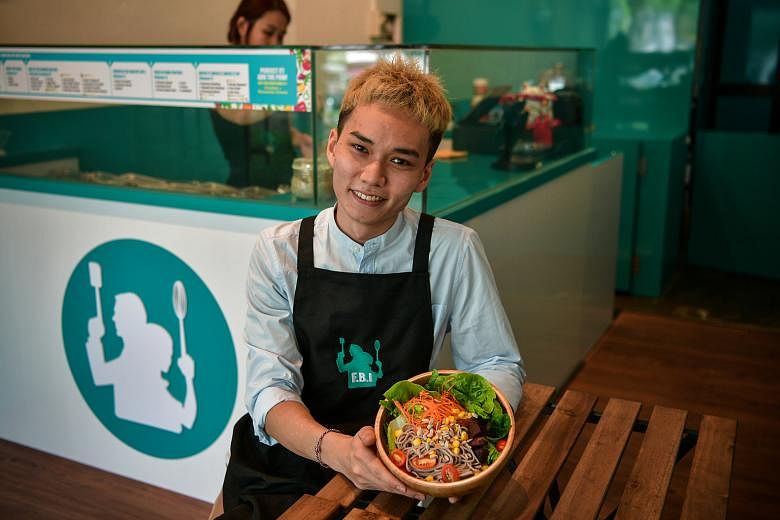Before Mr Guo Peifeng, 26, started salad shop Food Beverage Idealist, or FBI, last November in Toa Payoh North, he had never set foot in a kitchen.
Although learning to slice and dice was easy, figuring out the mix of ingredients needed to draw in the crowds has been a whole other story - one he hopes to rewrite for the better, if the CFE's strategies for growth can show him a way.
Mr Guo, after all, is taking a risk and trying to break new ground - something the committee is calling for. The small shop, set up by Mr Guo and his girlfriend Yvonne Ong, also 26, is an oddity in the heartlands, where hawker food is traditional fare.
And FBI has had a slow start.
After barely breaking even, the couple eked out a modest $1,000 profit last month as business picked up - an achievement they attribute to word of mouth.
"We haven't done enough publicity because we don't have the experience," says Mr Guo. "We're still trying to see what we need. We have Facebook and Instagram but it's not enough."
The pair - who cannot afford to hire any staff for now - have been trying their hand at new ideas since they opened: from one-for-one deals on special occasions to introducing salads served in a cone.
Not all their efforts have paid off. They initially sold frozen yoghurt, on top of salads and Thai milk tea, but had to sell the $2,000 machine a few weeks back for $1,200 because of poor demand.
The food business is alien territory for Mr Guo, whose first business venture some years back - a shop selling mobile phones and accessories, also in the heartlands - folded in a matter of months. He then worked for a telecom company.
But he and Ms Ong, who has a diploma in culinary science, poured $40,000 into FBI as they saw the niche market potential.
"Most salad shops are in the CBD, far away from housing estates. But we need them near schools and houses, too, to make it easier for people to have access to healthy food choices," says Mr Guo.
"We want to help kickstart this lifestyle."
Despite the rocky start, he is thinking big: his ideas include tying up with schools to get students to eat better, and expanding to other housing estates.
What he needs is help in figuring out how to get things right, including proper lessons on marketing, grants and opportunities to experiment with new equipment and ingredients at a reasonable cost, and the chance to learn from bigger salad shops.
"We either make it or we lose all our savings," he says. "We're still newbies at this, so any chance to look at how the best salad brands do things, or try new machines without paying thousands of dollars, is welcome."
What people like him want to know from the CFE: Are there grants and opportunities to help small businesses like Mr Guo's innovate, and try new machinery and methods at a reasonable cost? Can FBI and similar businesses pick up specific skills, such as in marketing and publicity? Are there opportunities to learn from more established players in their industry?
MR LIM DER SHING, co-founder of regional jobs portal JobsCentral Group, and a member of the CFE's sub-committee on Future Corporate Capabilities and Innovation, says:
First, Mr Guo should be congratulated on reaching profitability in an F&B business.
There have been many grant schemes introduced over the years to help companies grow their business. For example, the Productivity and Innovation Credit scheme is a major avenue where small businesses can get help to implement software and hardware improvements to their business.
To take it a step further, the CFE recommends that the criteria and areas of support across grants administered by different government agencies should be streamlined and customised with case studies specific to industries.
This will help SMEs better understand what is available and how it can help them specifically.
In terms of learning, we recognise that continuous entrepreneurial learning is critical and we want to do more.
In fact, the need to promote tighter collaboration in our corporate ecosystem, especially between large and small enterprises, is one of the CFE's recommendations.
Beyond that, sharing of knowledge via trade associations and other entrepreneurial groupings should be encouraged.
Skills-wise, a key strategy is to leverage on digital technology.
In the digital economy, a small salad shop in the heartland can transcend its physical limitations and be very competitive through the innovative use of digital marketing, e-commerce and last mile delivery.
Under the CFE's recommendation, businesses can expect more specialised and targeted advice about digital technologies relevant to them.


